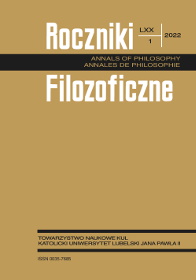Reply to My Friendly Critics
References
Craig, William L. 2011. “Yet Another Failed Anti-Molinist Argument.” In Perszyk, Molinism, 144–62.
Craig, William L. 2017. “A Molinist View.” In God and the Problem of Evil: Five Views, edited by Chad Meister and James K. Dew, Jr. Downers Grove, IL: IVP Academic.
Fischer, John M. 1994. The Metaphysics of Free Will: An Essay on Control. Cambridge, MA: Blackwell Publishers.
Fischer, John M. 2022. “An Actual-Sequence Theology.” Roczniki Filozoficzne 70 (1): 49–78.
Goetz, Stewart. 2022. “Some Musings about William Hasker's Philosophy of Mind.” Roczniki Filozoficzne 70 (1): 37–48.
Hasker, William. 1970. “Tri-Unity.” Journal of Religion 50:1–32.
Hasker, William. 1989. God, Time, and Knowledge. Ithaca, NY: Cornell University Press.
Hasker, William. 1993, “Zagzebski on Power Entailment.” Faith and Philosophy 10:250–55.
Hasker, William. 1999. The Emergent Self. Ithaca, NY: Cornell University Press.
Hasker, William. 2002. “The Absence of an Eternal God.” In God and Time: Essays on the Nature of God, edited by Gregory E. Ganssle and David M. Woodruff, 182–206. New York: Oxford University Press.
Hasker, William, 2004. Providence, Evil, and the Openness of God. London: Routledge.
Hasker, William. 2008. The Triumph of God Over Evil. Downers Grove, IL: InterVarsity.
Hasker, William. 2011. “The (Non-)Existence of Molinist Counterfactuals.” In Perszyk, Molinism, 25–36.
Hasker, William. 2013a. “What Is Naturalism? And Should We Be Naturalists?” Philosophia Christi 15 (1): 115–28.
Hasker, William. 2013b. Metaphysics and the Tri-Personal God. Oxford: Oxford University Press.
Hasker, William. 2018. “Incarnation: the Avatar Model.” In Oxford Studies in the Philosophy of Religion, vol. 8, edited by Jonathan L. Kvanvig, 118–41. Oxford: Oxford University Press.
Hasker, William. 2021a. “Constituting the Trinity.” Religious Studies, 57 (3): 523–31.
Hasker, William. 2021b. “Defending Constitution: A Rejoinder to Brian Leftow.” Religious Studies 57 (3): 553–62.
Helm, Paul. 2022. “Divine Causation and Analogy.” Roczniki Filozoficzne 70 (1): 107–20.
Jedwab, Joseph. 2011. “The Incarnation and Unity of Consciousness.” In The Metaphysis of the Incarnation, edited by Anna Marmodoro and Joseph Hill, 168–85. Oxford: Oxford University Press.
Jedwab, Joseph. 2022. “A Neo-Lockean Theory of the Trinity and Incarnation.” Roczniki Filozoficzne 70 (1): 173–89.
Koons, Robert C. 2022. “Some Puzzles about Molinist Conditionals.” Roczniki Filozoficzne 70 (1): 137–54.
Łukasiewicz, Dariusz. 2022. “On William Hasker's Theodicy, the Doctrine of Continuous Creation and the Nature of Morality.” Roczniki Filozoficzne 70 (1): 155–71.
Nagel, Thomas. 1997. The Last Word. New York: Oxford University Press.
Oppy, Graham. 2022. “Anti-Naturalistic Arguments From Reason.” Roczniki Filozoficzne 70 (1): 15–35.
Pike, Nelson. 1965. “Divine Omniscience and Voluntary Action.” Philosophical Review 74:27–46.
Pinnock, Clark. 2001. Most Moved Mover: A Theology of God’s Openness. Downers Grove, IL: InterVarsity.
Pinnock, Clark, Richard Rice, John Sanders, William Hasker, and David Basinger. 1994. The Openness of God: A Biblical Challenge to the Traditional Understanding of God. Downers Grove, IL: InterVarsity.
Perszyk, Kenneth, ed. 2011. Molinism: The Contemporary Debate. Oxford: Oxford University Press.
Rogers, Katherin. 2022. “Saving Eternity (and Divine Foreknowledge and Free Will): A Reply to Hasker.” Roczniki Filozoficzne 70 (1): 79–89.
Sanders, John. 2007. The God Who Risks: A Theology of Divine Providence. 2nd ed. Downers Grove, IL: InterVarsity.
Stump, Eleonore. 2022. “The Openness of God: Hasker on Eternity and Free Will.” Roczniki Filozoficzne 70 (1): 91–106.
Wojtysiak, Jacek. 2022. “A Bigger God and the Pre-Creation Situation: Some Remarks Inspired by William Hasker.” Roczniki Filozoficzne 70 (1): 121–36.
Zimmerman, Dean. 2011a. “A Precis of ‘Yet Another Anti-Molinist Argument’.” In Perszyk, Molinism, 140–43.
Zimmerman, Dean. 2011b. “An Anti-Molinist Replies.” In Perszyk, Molinism, 163–86.
Copyright (c) 2022 Roczniki Filozoficzne

This work is licensed under a Creative Commons Attribution-NonCommercial-NoDerivatives 4.0 International License.





